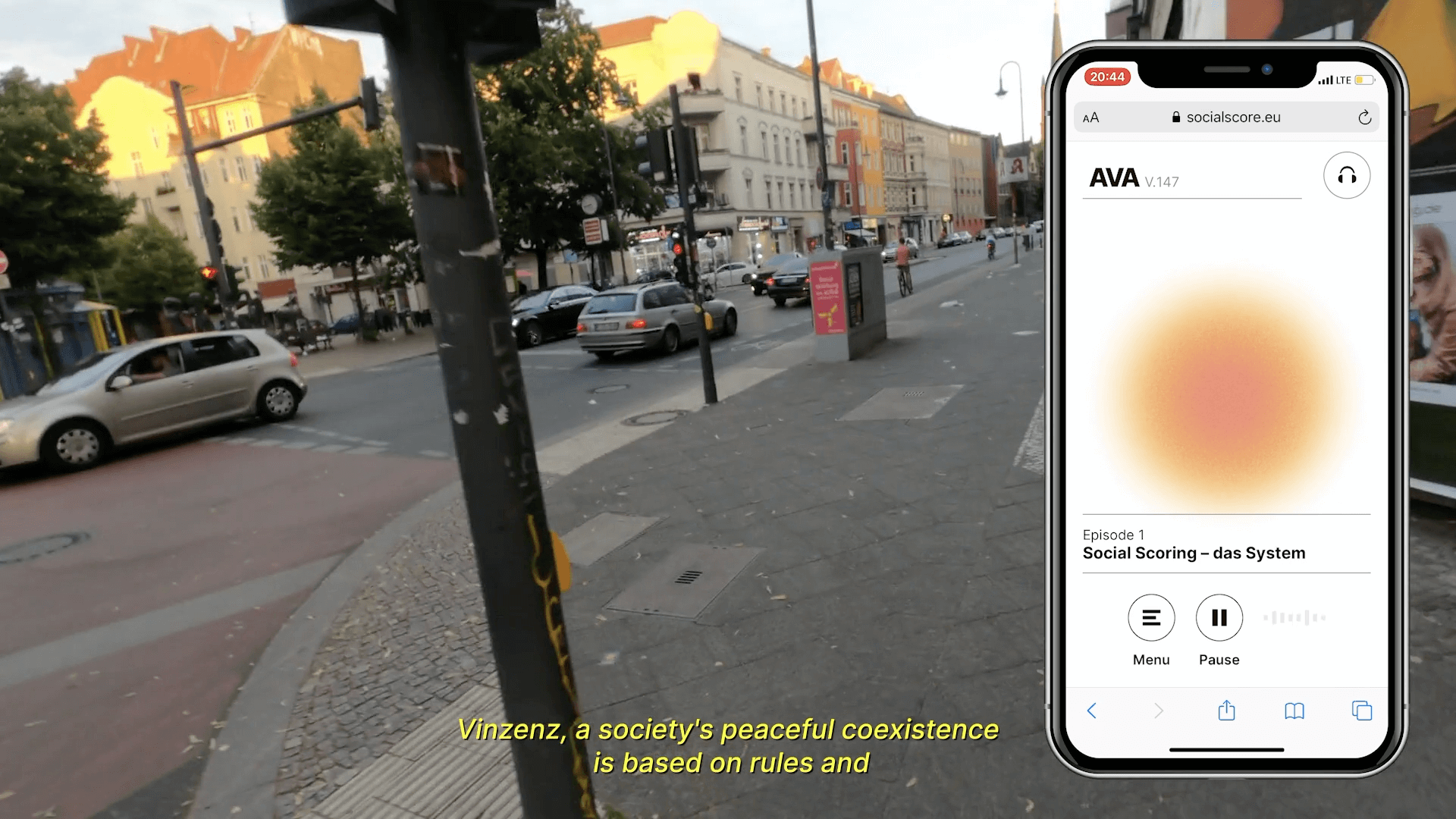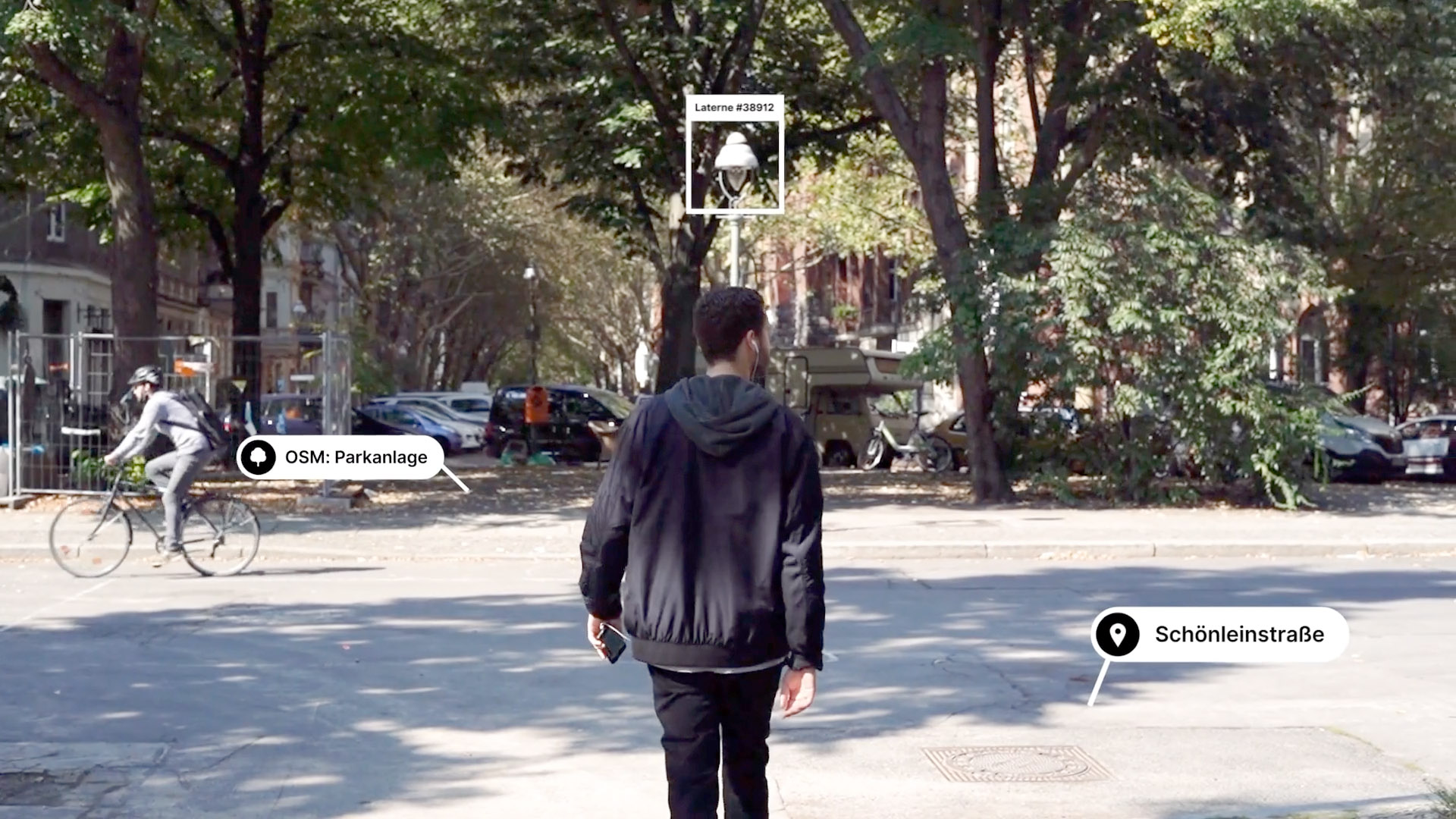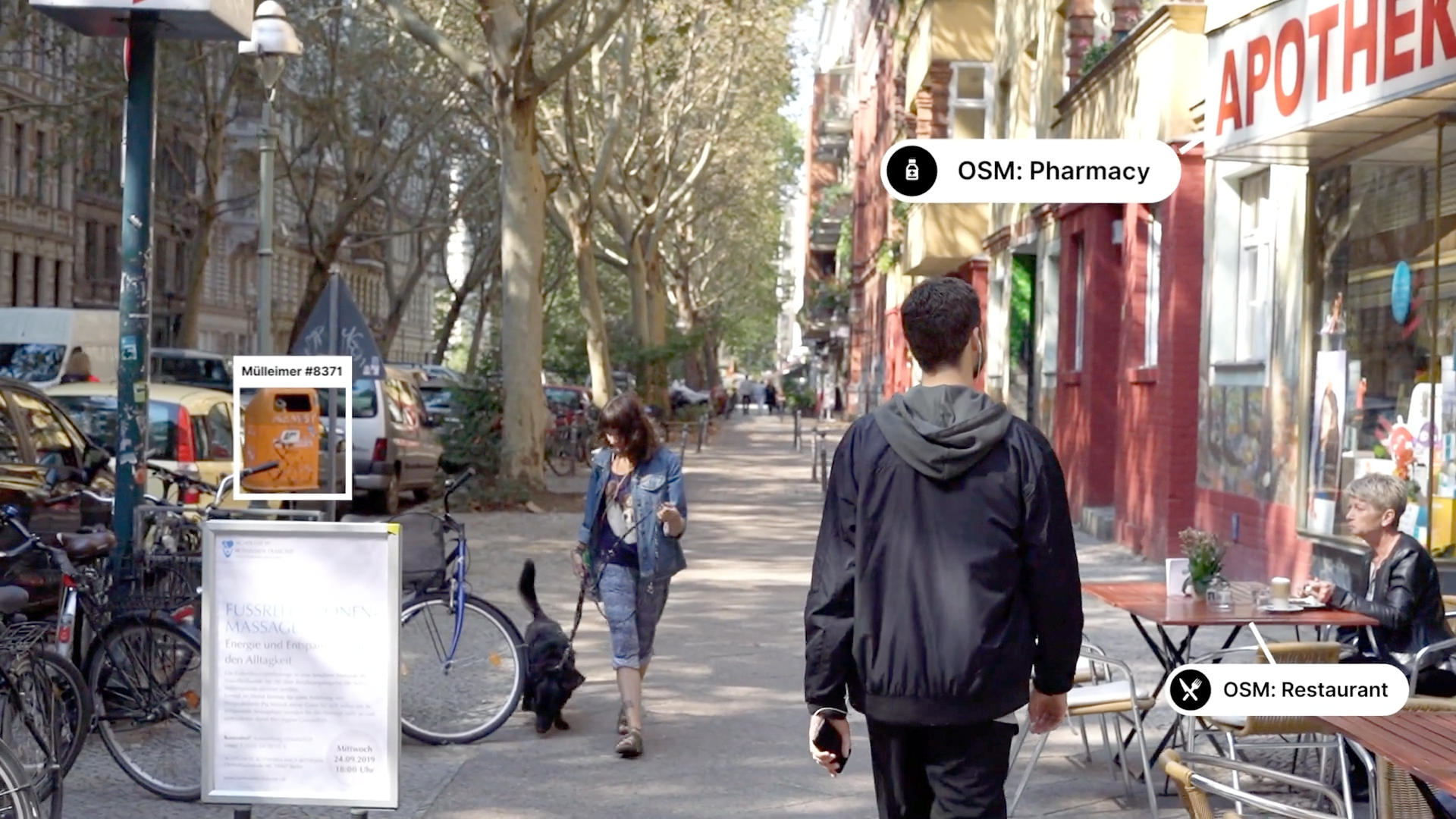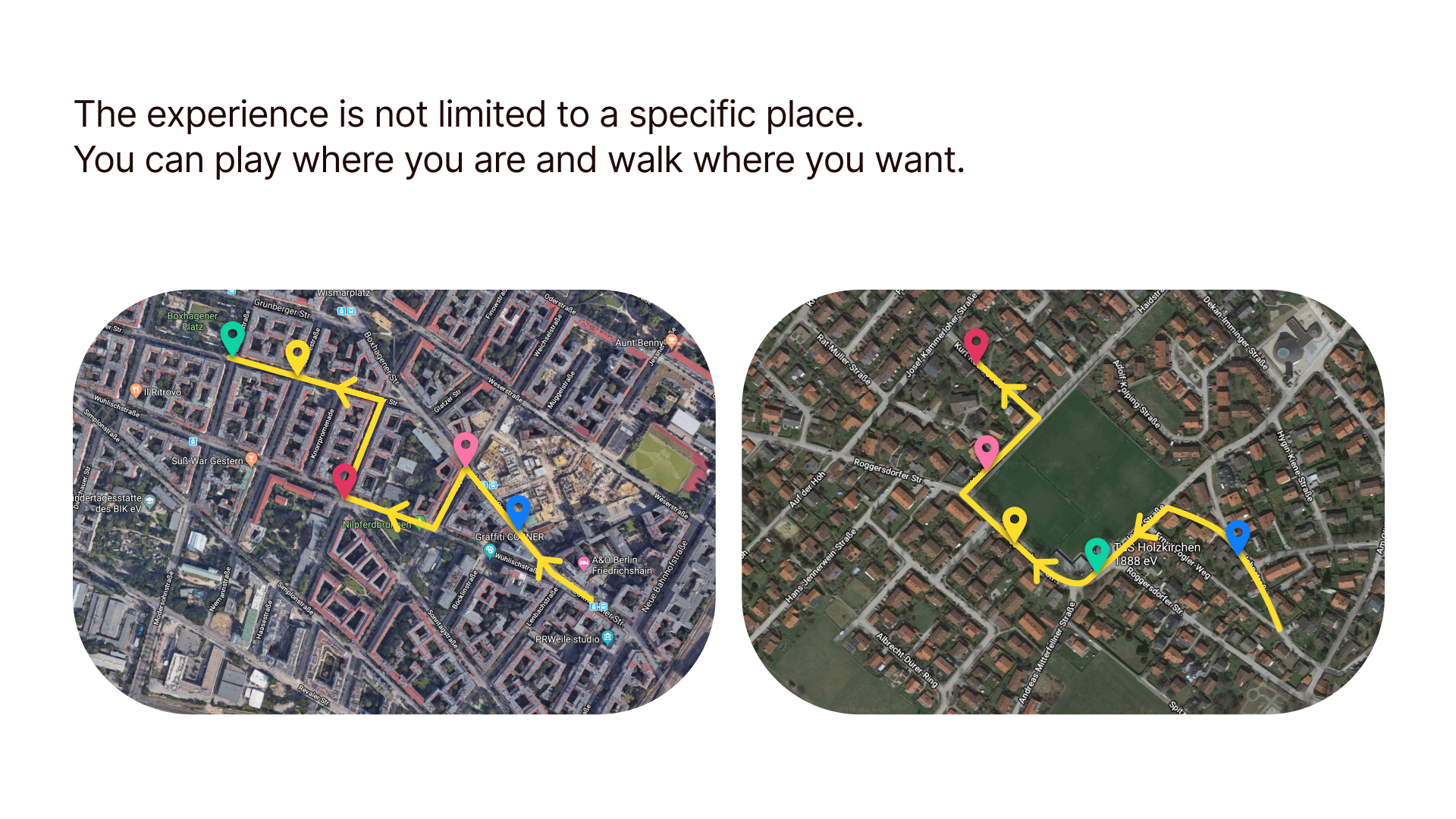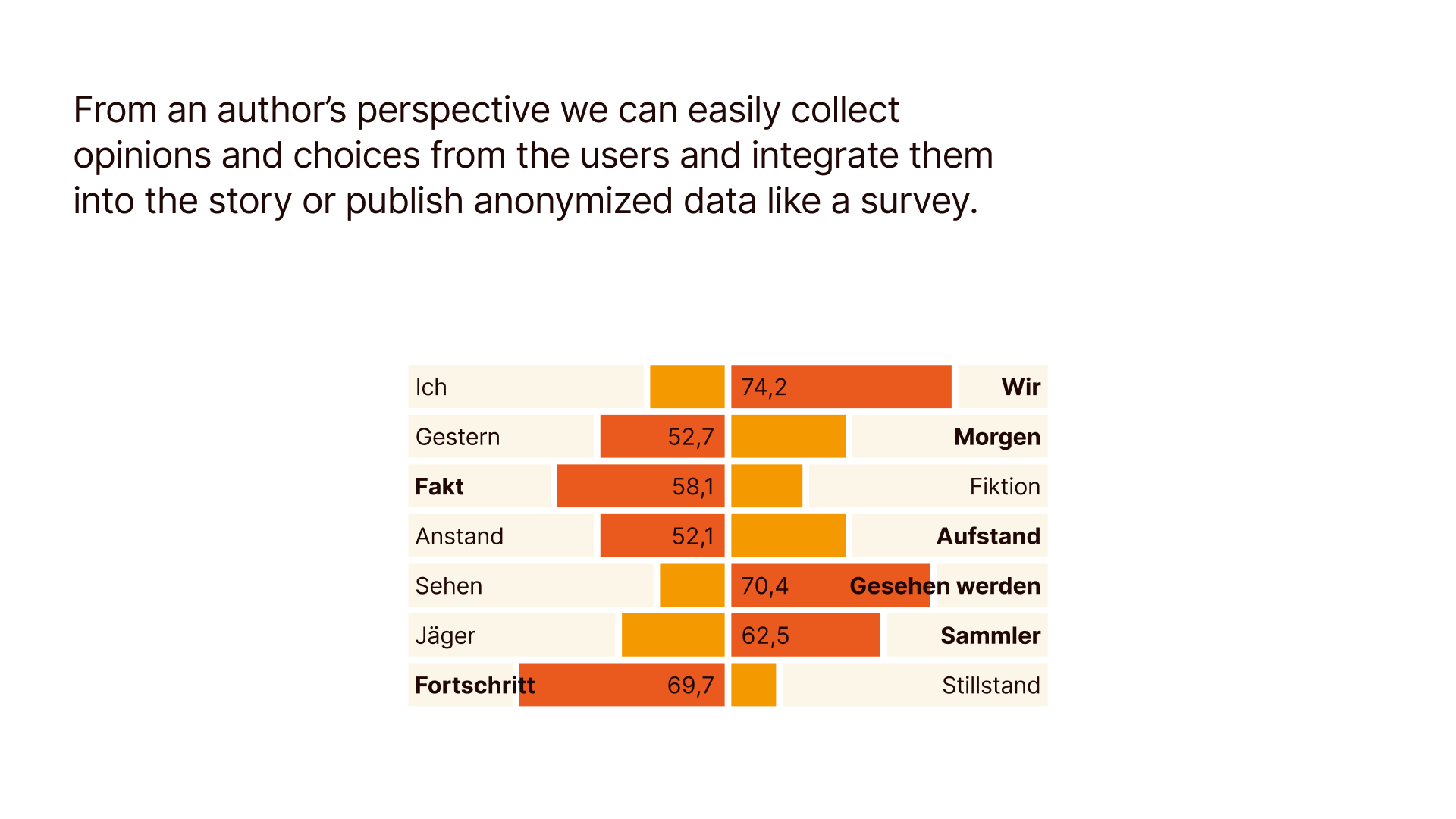Social Score - Nothing to hide
Basic information
Project Title
Full project title
Category
Project Description
Social Score is the first interactive, participatory and location-based augmented audio experience that can be played directly in the browser. The fictious AI "AVA" negotiates the potential introduction of a social scoring system in Germany by sending the listeners on a personalised journey in their surroundings.
Project Region
EU Programme or fund
Description of the project
Summary
Social Score is the first interactive and location-based listening experience that can be played directly in the browser.
The audio piece negotiates the potential introduction of a social scoring system in Germany. With it, listeners have the opportunity to take a walk with the fictitious AI "AVA". The AI acts on behalf of the so-called "Initiative for Freedom and Social Promotion" and tries to analyse its users behaviours in order to decide on a possible implementation of such a system in Germany.
During the walk, AVA confronts the listeners with personalized calls to action and questions while evaluating the listeners' decisions –– eventually presenting them with potential opportunities and consequences of introducing such a system in Germany.
The augmented audioplay is composed live and interactively, according to the listeners' individual walking route and direct surrounding. This is achieved by analyzing GPS position data and comparing it with a database of location and object data. In combination with other public data sets, such as weather, time and location-based statistics on crime rates, rents and population density, targeted narrative content is generated live and adapted to the listeners' walking route. This makes the listeners interact directly with their surroundings, creating a truly interactive, relevant and at last educational audio experience.
Original German trailer: https://vimeo.com/379745779
Translated English trailer: https://vimeo.com/485143843
Here's a full documentation of the project: https://vimeo.com/433763574
Key objectives for sustainability
The big sustainability advantage of Social Score and the technology behind it is, that it is part of a larger research project that aims to provide module-based tools for journalists, content creators and educators. It enables them to easily and intuitively realize their own augmented audio projects, strengthening the educational impact by the means of personalized content.
Another sustainability aspect is the reusability of the data. While the information in linear radio broadcasts is no longer up to date after just a few days, the data sets in Social Score are always updated and delivered in real time. As a result, production costs are reduced in the longterm as elements such as the voice-over automatically implement up to date information.
Key objectives for aesthetics and quality
The main aesthetic goal in this project was to convey the subject matter of the potential introduction of social scoring sytems in Germany in an interactive, relevant, but also entertaining way. We achieved this by telling the story in a non-linear way, giving the user the chance to interact with the fictitious AI AVA and therefore making the users and their surroundings actively engage in the narrative––by walking their individually chosen route through the city and by speaking or typing into the smartphone, directly influencing the narrative. Works in the realm of postdramatic theatre and public interventions by Rimini Protokoll and Hofmann & Lindholm for instance have inspired us along the way.
Making AVA and the „Initiative for Freedom and Social Promotion“ as a narrative proxy, made it easier to create a meta-fictional and entertaining element to the whole experience. It gives us the chance to negotiate the introduction of a social scoring systems from a neutral position instead of daemonizing it per default. Keeping this distance, we let AVA and the user have a conversation about the possibilities and pitfalls of such systems, to form their own individual synthesis and opinion on the topic.
Since AVA is an AI and we wanted to ensure full flexibility, we chose to use a computer generated voice. We used a generated voice by Google that we tweaked and adapted in multiple recording sessions in order to make its sound more similar to a human voice but leave its computer generated mark. In the end, we created a voice-over that sounded soothing but distant at the same time, creating narrative and dramaturgical friction.
Key objectives for inclusion
The main objective of the project was to present an abstract, often distant societal issue in an easy, personalized and therefore ultimately relevant format. The topic of organizing our future in increasingly digital societies with a social scoring system for example, is presented with its potentials and pitfalls, free and easily accessible from any smartphone. There is no login or installation of any additional software necessary in order to keep the hardware boundaries as low as possible. A pair of headphones and a smartphone with allowed GPS data function are enough to experience Social Score in any environment the user chooses to be in.
So far, the project is realized in German. We are currently looking for additional funding to translate Social Score into other languages such as Spanish, French, English and Italian and would invest part of the prize money into translations in order to broaden the inclusive impact of this project on a European and potentially global scale.
Results in relation to category
In relation to the topic of "Interdisciplinary education models":
Firstly, the topic is educational in the sense that it aims at informing and negotiating the potential impact of a social scoring system in Germany. It was important to bring our users and the narrative into a dialogue rather than presenting them with well-rounded solutions. We believe that education means to teach how to think rather than teaching what to think––hence Social Score is rather about asking questions than giving answers, allowing users to act as wholesome citizens understanding and valuing their freedom or lack thereof.
Since the beginning of the pandemic we have been increasingly working with schools as the audio play conveys a complicated topic in an enganging and entertaining way. Since Social Score is played in the outdoors during a walk, restrictive Covid regulations were not a problem and above all, teachers had the opportunity to give their class a break from the redundancy of homeschooling. After the experience we initiated a digital-roundtalk with the teacher and the pupils to further discuss subjects such as personal freedom, big data and surveillance. Recently we've done this with the Friedrich-Schiller-Gymnasium in Marbach and our next "schooltrip" will lead us to a Gymnasium in Nürnberg mid June.
How Citizens benefit
By introducing Social Score as a free and accessible audio experience to a broader public we are not only promoting the discourse about topics such as data harvesting, surveillance and freedom in general, but broadening societal discourse on rents, crime rates or environmental pollution which lead to reevaluating the way we live together as humans in shared spaces, such as our cities and villages.
For example talking about topics like housing prices mostly focuses on big cities such as Munich, Hamburg or Berlin. The problem is, many people on the countryside do not realize the relevance of the topic themselves and how it might be connected to them. We aim at including people from urban, rural and suburban contexts to question and reflect on their ways of living together in a society based on democratic values.
Social Score invites users to engage with seemingly complicated topics in an entertaining and non-linear way, creating a different media experience than conveyed by classic media which can seem distant and less engaging.
What has been the impact of this involvement on the project
We give users the opportunity to share their results of their interactive walk at the end of the experience. This feeds into a general statistic in order for them to "compare" themselves with other users and to see how many points they collected. This idea of gamification of harvested data is also part of the narrative and aims at asking users to reflect on data sharing values and privacy. It further opens a discourse about the relation between individual and societal responsibility in Democracies.
Innovative character
As the jury of the International Documentary Film Festival Munich put it:
« [Social Score] not only dares to take a completely new approach by combining AI technology and listening experience, it also sharpens our perception and inspires our individual mental cinema by placing our own reality in the context of the possible future [...]. »
Social Score is a proof of concept showing that augmented and truly personalized audio with artificial voices can have an impact on the way we consume information and knowledge.
- Social Score demonstrates, that we can have experiences with artificial voices, that don't feel artificial at all and that we can use them to create extended, relevant experiences for education, societal discourse and participation, to raise awareness and discuss our future together.
- Social Score is for free and needs no additional software.
- Social Score also proves that web technology is ready to deliver novel projects in the realm auf augmented audio. We focus on this, because it takes out barriers of previous projects that rely on native apps. No special phone brand needed, no extra download of the app. Opening the website and hitting start is enough. Keeping it simple and accessible all the way.
- Further, we achieved a project longetivity that cannot be met with classic linear formats. As Social Score is generated in real time when users start the experience, it uses up to date data from the users imminent surrounding. Whereas classic linear audio production, such as radio pieces about covid statitics or current housing prices get outdated quickly as the data changes.
- Experimenting with location based non-screen interfaces. Social Score is also exploring the possibilities of content interfaces that dont rely on a screen, but look at other metadata, for example the users position, the weather or the time of day.


